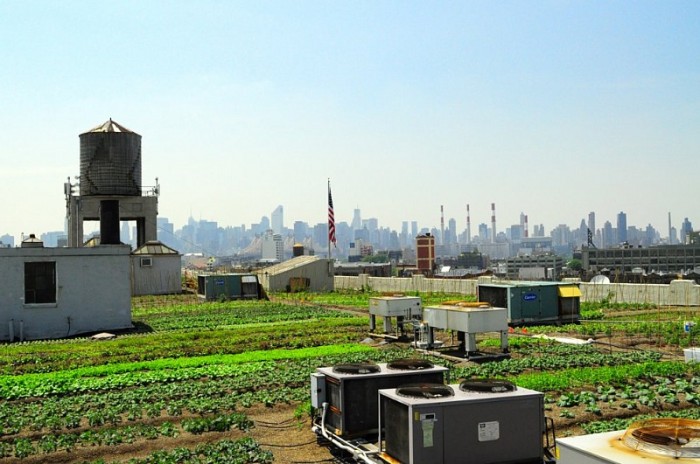With the recent launch of the new USDA Farm Service Agency loan program for beginning-farmers, we thought it might be appropriate to address some of the many credit options that new and beginning farmers have these days. Bringing you the details on a new initiative by the Farm Credit System to service the needs of new and beginning farmers is Sara Albert. Sara Albert practiced corporate and franchise law in Dallas. She is currently pursuing an LL.M. degree in Agriculture and Food Law at the University of Arkansas in Fayetteville, with a particular emphasis on urban agriculture and food policy issues.
The urban farmer – and others farming in less traditional, hyper-local ways – will now have greater access to a well-established credit resource for agriculture. Farm Credit System (“FCS”) has recently adopted an initiative to serve the emerging market segment represented by the local food farmer.
FCS is a privately owned, federally chartered network of bank cooperatives. Signed into legislation by Woodrow Wilson in 1916 as a “Government Sponsored Enterprise,” the statutory mandate of FCS was to serve all types of creditworthy agricultural operations and producers. FCS has provided reliable financing to the farm sector for generations and has been instrumental in its transformation to the industrialized model that dominates agriculture today. But new farming models are now a part of our urban, suburban and exurban landscapes. Consumer demand for farm-to-table locally grown food has prompted FCS to re-focus some of its resources to the businesses that are responding to this socio-cultural shift.
In April of this year, Farm Credit Administration (“FCA”), which makes the regulations that govern the network of FCS lending institutions, directed member banks to develop marketing plans to “promote diversity and inclusion.” FCA’s diversity directive addresses the current reality that the small and/or urban agriculture businesses – whether producers, farm-related service providers, processors, or marketers – engaged in the local and regional food systems – are underserved by FCS. Food hubs, Community Supported Agriculture ventures, aggregators, hydroponics growers, hoop house farmers, aquaponics producers, retail agriculture (direct marketing), and vertical farmers are several of the business models in the local and regional system that need financial support from bankers who understand their business.
Through their young, beginning and small (YBS) farmer lending program already in place, FCS has a history of providing credit to new rural farmers. Through this new initiative, FCS promotes a clear objective to respond to the evolving demography of agricultural operators who are creditworthy and otherwise eligible for FCS funding. Not a lender of last resort, FCS perhaps recognizes an opportunity for growth of their own through development of this up-and-coming slice of the market.
As further guidance to FCS lenders, on October 11, 2012 the FCA Board approved Bookletter BL-066 entitled “Providing Credit to Farmers and Ranchers Operating in Local/Regional Food Systems.” A Bookletter is a document issued by an FCA official that communicates FCA’s legal interpretations and the Agency’s position on specific issues. BL-066 explains how FCS associations can serve the financing needs of local food farmers and certain farm-related businesses under their existing statutory and regulatory framework. Specifically, the Bookletter provides guidance to FCS banks on:
- Determining eligibility and scope of financing for local food farmers;
- Determining when a local food hub, aggregator, or support business qualifies for financing as a farm-related service business, processing or marketing operation, or similar entity
- Applying standards of creditworthiness and underwriting to local food farmers;
- The role of FCS banks in supporting FCS association lending;
- Educational support for local food farmers; and
- Developing a lender’s strategic business plan for emerging agriculture markets.

The beautiful Brooklyn Grange, an example of one of the many types of new but economically viable agricultural businesses that FCS is seeking to provide with credit.
Eligibility of the borrower is the threshold test for access to FCS credit. Even before the creditworthiness of the prospective farmer is analyzed, the borrower must demonstrate that he or she is a “bona fide farmer or rancher.” Earlier FCA Regulations defined a bona fide farmer or rancher as a “person owning agricultural land or engaged in the production of agricultural products…” The Bookletter points out that existing regulations do not specify where someone’s agriculture production must take place to qualify them as a bona fide farmer. “Therefore,” states BL-066, “if a person is engaged in producing an agricultural product for market in any location (rural, suburban or urban) that person most likely meets the definition of a bona fide farmer and would be eligible for FCS financing.”
Likeswise, creditworthy processing and marketing operations and other service businesses whose operations are directly related to the farmer’s agricultural production are eligible for FCS financing under this guidance. Businesses like contract slaughter facilities, beekeepers who provide bees for pollination of orchards, cold storage facilities, regional food hubs, mobile wine bottling units, and agricultural produce grading businesses can also apply for loans.
FCS’s diversity initiative opens up a world of possibility to those building businesses in our local and regional food systems. Targeting this market of creditworthy farmers is affirmation of the relevance of the rising local food sector. And it is a resounding nod to the demand for change in how and where we want our food produced and delivered.
— By Sara Albert, Esq.

















